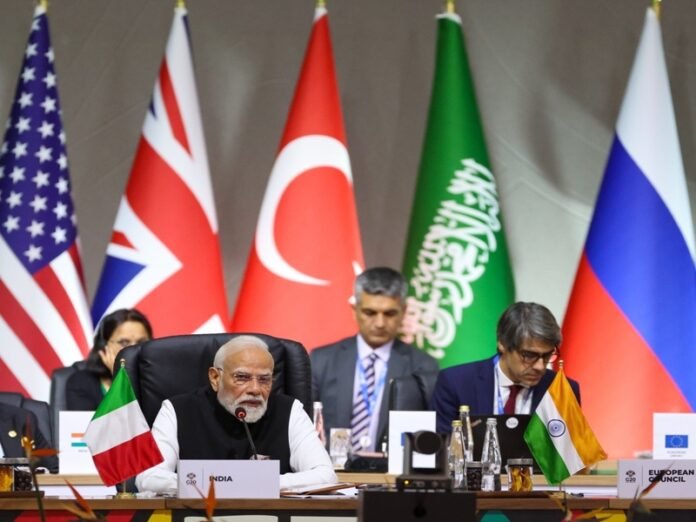At the G20 Leaders’ Summit in Johannesburg, Prime Minister Narendra Modi underscored how vital it is for countries to deepen global collaboration, bolster disaster resilience and pursue sustainable growth, as he addressed both opening‑day sessions.
In a string of X posts – backed by a detailed statement from the Prime Minister’s Office – Modi reiterated India’s people‑first growth philosophy. He urged the G20 to adopt new development metrics that help balance progress with care for our planet.
Through X, the Prime minister highlighted that the second summit session centred on building a resilient world amid disasters and climate change, ensuring just energy transitions, and strengthening global food systems. “India has been actively working on all these fronts, building a future that is human‑centric and inclusive,” he wrote.
Emphasising that world‑changing issues demand coordinated responses, Modi explained why India set up the Disaster Risk Reduction Working Group during its G20 Presidency. He argued that disaster management must shift from a “response‑centric” model to a “development‑centric” one, pointing to the Coalition for Disaster Resilient Infrastructure as a concrete example.
Modi also put forward a proposal for a G20 Open Satellite Data Partnership. The aim would be to make satellite imagery and analysis produced by G20 space agencies more accessible to developing nations, especially those in the Global South. He noted that better access to space‑based tools would support agricultural, fisheries and disaster‑management efforts.
Reaffirming India’s pledge to sustainability and clean energy, Modi introduced a G20 Critical Minerals Circularity Initiative. The goal is to drive recycling, urban mining, second‑life battery use and related innovations to safeguard supply chains and forge cleaner pathways.
Calling climate change “one of the most serious threats to food security,” the Prime Minister spotlighted India’s large‑scale nutrition and food‑security programme, its prominent health‑insurance scheme and its broad crop‑insurance framework. He also highlighted India’s drive to promote Shree Anna (millets) for nutrition and climate resilience.
According to a detailed PMO press note, the opening session – titled “Inclusive and sustainable economic growth leaving no one behind” – allowed Modi to thank the South African presidency for its work on skilled migration, tourism, food security, AI, digital innovation and women’s empowerment. He observed that many landmark decisions made during India’s recent G20 presidency were being carried forward.
With the G20 meeting staged on African soil for the first time, the Prime Minister called for a rethink of traditional development metrics. He argued that growth should not outpace ecological balance, and urged the group to draw on India’s philosophy of Integral Humanism—a belief that harmonises individual, societal and natural interests.
Looking ahead, Modi presented six fresh initiatives for the G20 to consider:
1. A G20 Global Traditional Knowledge Repository to capture and employ humanity’s shared wisdom.
2. A G20 Africa Skills Multiplier aimed at training one million certified trainers for African youth to sustain regional capacity building.
3. A G20 Global Healthcare Response Team composed of experts from all member states for rapid deployment during health emergencies.
4. The G20 Open Satellite Data Partnership to expand access to space‑based data for development sectors.
5. The G20 Critical Minerals Circularity Initiative to advance recycling, urban mining, and sustainable battery use.
6. A G20 Initiative on Countering the Drug Terror Nexus to tackle illicit trafficking and disrupt the drug‑terror economy.
In the session titled “A Resilient World – G20 Contribution to Disaster Risk Reduction; Climate Change; Just Energy Transition; Food Systems,” Modi welcomed continuity in India’s Disaster Risk Reduction Working Group and urged richer nations to honour their promises on affordable climate finance and technology transfer to poorer countries.
He also called for a stronger united effort on food security, urging that the Deccan Principles on Food Security, adopted during India’s presidency, guide a G20 roadmap for future action.
Seeking a fairer global governance structure, Modi stressed the importance of amplifying the Global South’s voice. He recalled the historic inclusion of the African Union as a permanent G20 member in New Delhi and insisted that this spirit of inclusivity extend beyond the G20 itself.
Modi thanked South African President Cyril Ramaphosa for his warm hospitality and praised the successful conduct of the Summit. This marks the Prime Minister’s twelfth participation in a G20 Leaders’ Summit.
Stay informed on all the latest news, real-time breaking news updates, and follow all the important headlines in world News on Latest NewsX. Follow us on social media Facebook, Twitter(X), Gettr and subscribe our Youtube Channel.


